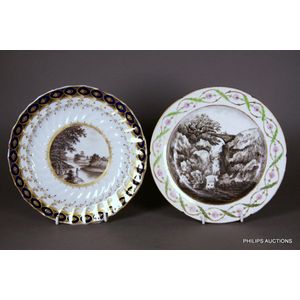Derby Named View Plates, 1790-1792
You must be a subscriber, and be logged in to view price and dealer details.
Subscribe Now to view actual auction price for this item
When you subscribe, you have the option of setting the currency in which to display prices to $Au, $US, $NZ or Stg.
- Manner of .... / Style of ..... - A cataloguing term where the item, in the opinion of the cataloguer is a work in the style of the artist, craftsman or designer, possibly of a later period.
- Circa - A Latin term meaning 'about', often used in the antique trade to give an approximate date for the piece, usually considered to be five years on either side of the circa year. Thus, circa 1900 means the piece was made about 1900, probably between 1895 and 1905. The expression is sometimes abbreviated to c.1900.
- Mazarin Blue - Mazarin blue, also known as bleu de Mazarin, is a shade of blue named after Cardinal Mazarin, a prominent French statesman and Catholic cardinal who lived in the 17th century. The color is a deep, rich blue with a hint of purple, and it was popular in France during the Baroque period.
- Roundel - A roundel is a circular disk, medallion or border on a plate or dish, on an object of furniture. A plate or dish will often have a central circular bordered decoration, termed a roundel. In furniture the word is often used instead of the word 'patera' to describe a turned circular decoration. In recent times use of the word has expanded to encompass any circular area on an object.
- Gilding - Gilding is a method of ornamentation whereby a thin sheet of gold metal is applied to items made of wood, leather, ceramics, glass and silver for decorative purposes.
For furniture including mirrors, the sheet of gold is usually applied over a coating of gesso. Gesso is a mixture of plaster of Paris and gypsum mixed with water and then applied to the carved wooden frames of mirrors and picture frames as a base for applying the gold leaf. After numerous coats of gesso have been applied, allowed to dry and then sanded a coat of "bole", a usually red coloured mixture of clay and glue is brushed on and allowed to dry, after which the gold leaf is applied. Over time parts of the gilding will rub off so the base colour can be seen. In water gilding, this was generally a blue colour, while in oil gilding, the under layer was often yellow. In Victorian times, gilders frequently used red as a pigment beneath the gold leaf.
Metal was often gilded by a process known as fire gilding. Gold mixed with mercury was applied and heated, causing the mercury to evaporate, the long-term effect of which was to kill or disable the craftsman or woman from mercury poisoning. The pursuit of beauty has claimed many victims, not the least of which were the artists who made those pieces so highly sought after today.
This item has been included into following indexes:
Visually similar items

Two sepia toned named view dessert plates Chamberlain Worcester and Chamberlain Worcester style, circa 1795, one plate with gold script Chamberlain Worcester mark, a blue bordered shanked plate with gilded lozenges and vegetal motifs, centred with 'Friars

A pair of Royal Worcester hand painted highland cattle plaques signed Harry Stinton, 26 cm diameter

A neoclassical plate attributed to Coalport, circa 1810, a neoclassical plate with a formal guilloche border in gilt on cobalt punctuated with four cartouches of classical figures and allegories in white upon an iron red ground, centred with an unusual sce

A set of four Royal Copenhagen Harald Wiberg gnome plates
